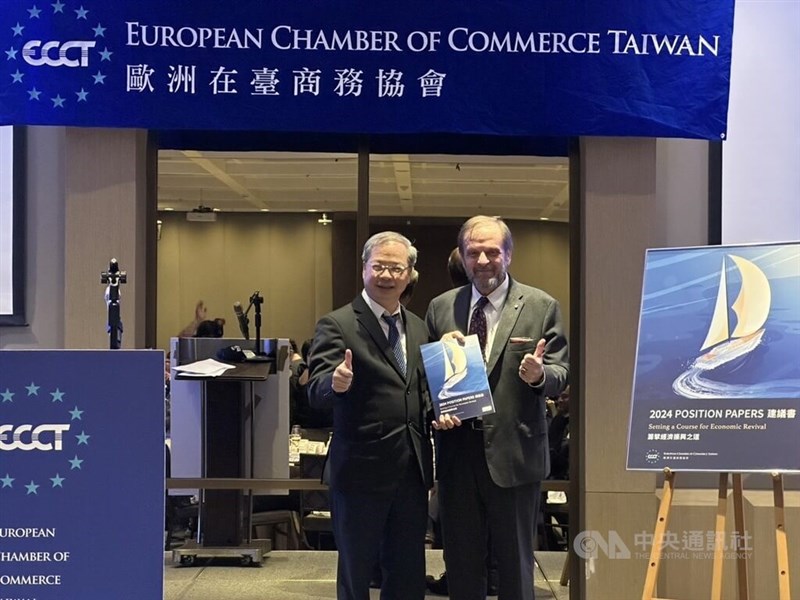
Taipei, Nov. 23 (CNA) The European Chamber of Commerce Taiwan (ECCT) released its 2024 Position Papers on Thursday, in which it proposed recommendations mainly in the areas of energy, talent and internationalization to help boost the country's business environment.
ECCT Chairman Giuseppe Izzo said this year's report, titled, "Setting a Course for Economic Revival," included submissions from 25 ECCT committees and raised 175 issues, including 67 not previously included.
"Taiwan's economy is facing headwinds and choppy seas and the outlook for 2024 is uncertain," Izzo said, stressing that due to uncertainties Taiwan needs to chart a clear course to help it "avoid the worst conditions that are beyond its control" through removing regulatory constraints, revising unsuitable laws and regulations, and streamlining administrative procedures.
Energy, talent, and internationalization are the three main issues raised in the paper, according to the chamber.
Izzo called for the "prioritization of renewable energy capacity expansion," especially in the field of offshore wind power, saying official targets have not been met due to "local content requirements, regulatory red tape, and difficulties in financing."
Therefore, the chairman said, the chamber recommends revising rules to encourage local supply chain competitiveness, streamlining the permit process, and liberalizing the energy market.
Also regarding energy, the ECCT called on the government to support the country's transition to transport powered by electricity, particularly by removing regulations that are slowing down the installation of charging infrastructure.
Regarding expanding Taiwan's talent pool, Izzo said that Taiwan continues to face shortages of skilled and semi-skilled domestic and foreign workers due to shifting demographics, overly restrictive labor laws, and rules regarding visas and work permits.
Family-friendly policies, for example, should be further promoted, according to the chamber. "Offering young parents more flexible options for remote work, allowing employees to choose to work from home rather than taking unpaid parental leave, and building or subsidizing the building of more childcare facilities" are some of the policy changes that could be made to improve the current situation.
Regarding internationalization, the chamber raised the issues of adopting international standards, enhancing digitization and promoting bilingualism.
Given that policy, laws, regulations and other public announcements are mainly bilingual, the ECCT noted that the government should now pay attention to the lack of English proficiency in those working in government ministries.
A representative from the chamber's education committee called for the incorporation of English proficiency as a criterion for promotion and for the inclusion of more new residents who are bilingual.
National Development Council Minister Kung Ming-hsin (龔明鑫), who was invited to the position papers launching event, lauded the increasing cooperation and trade between Taiwan and the EU, noting that in the wake of a Taiwanese delegation visiting Europe in 2021, the NDC launched the "Strengthening Taiwan-Europe Connectivity Project," to boost exchanges in various fields including investments, education, and scientific research.
Responding to the energy recommendations, Kung stressed that the installed capacity of wind and solar power has risen from 1.9 gigawatts in 2016 to 14.1 gigawatts - a seven-fold rise.
He expressed gratitude to European businesses that have "offered strong support" in developing the country's offshore wind energy projects, which have become "the leading example in Asia and have attracted Japanese and South Korean companies to come and learn from Taiwan's experience."
Kung said the Ministry of Economic Affairs has been in constant communication with European developers to make the completion of the next round of offshore wind projects more smooth sailing.
Regarding expanding its talent pool, the NDC minister touted the setup of the Talent Taiwan Office, a one-stop service center dedicated to recruiting foreign professionals and helping them get accustomed to life in Taiwan.
Officially launched in early November, it aims to not only assist Employment Gold Card holders but all employed foreign professionals -- currently numbering more than 56,000.
There have also been increased efforts to attract and retain foreign students and professionals, Kung said, adding that immigration rules have been relaxed, which makes it easier for skilled migrant workers to stay and apply for residency.
Kung said the government has also been keeping up with international standards and regulations in order to allow Taiwan to participate in international organizations and agreements, including the CPTPP (Comprehensive and Progressive Agreement for Trans-Pacific Partnership).
"A bilateral investment agreement (BIA) [with the EU], if signed, would also facilitate Taiwan's improvement in this matter, as an institutional agreement would promote and protect trade between the two sides," Kung said.
The ECCT publishes a series of Position Papers annually, which address the concerns of the chamber's member companies regarding the business environment in Taiwan and provide practical recommendations for solving regulatory issues, according to the organization's website.
- Business
U.S. dollar closes lower on Taipei forex market
05/10/2024 04:18 PM - Society
Magnitude 5.8 earthquake rattles eastern Taiwan
05/10/2024 04:07 PM - Society
Teenagers indicted for alleged involvement in junior high school murder
05/10/2024 03:42 PM - Business
Taiwan shares close up 0.72%
05/10/2024 01:55 PM - Politics
Tsai, Lai thank Japan's Taiwan-friendly group for support
05/10/2024 01:42 PM
